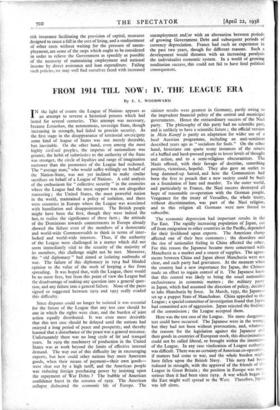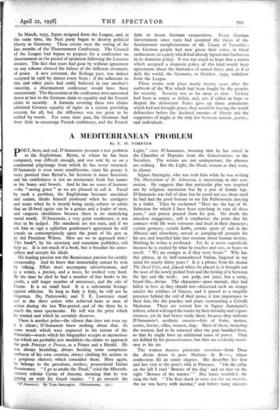FROM 1914 TILL NOW: IV. THE LEAGUE ERA
By E. L. WOODWARD
IN the light of events the League of Nations appears as an attempt to reverse a historical process which had lasted for several centuries. This attempt was necessary, because Leviathan, the autonomous, sovereign State, though increasing in strength, had failed to provide security. As the first stage in the disappearance of territorial sovereignty some kind of league of States was not merely desirable, but inevitable. On the other hand, even among the most highly civilised peoples, the impetus of nationalism was greater, the habit of submissioa to the authority of the State was stronger, the circle of loyalties and range of imagination narrower than the promoters of the League had reckoned. The "average man," who would suffer willingly on behalf of the Nation-State, was not yet inclined to make similar sacrifices on behalf of a League of Nations. A cold analysis of the enthusiasm for " collective security " in the countries where the League had the most support was not altogether reassuring ; the United States, the most powerful nation in the world, maintained a policy of isolation, and there were countries in Europe where the League was associated with humiliation and disappointment. The British people might have been the first, though they were indeed the last, to realise the significance of these facts ; the attitude of the Dominions towards commitments in Europe already showed the failure even of the members of a democratic and world-wide Commonwealth to think in terms of inter- locked and world-wide interests. Thus, if the authority of the League were challenged in a matter which did not seem immediately vital to the security of the majority of its members, this challenge might not be met. Moreover, the " old diplomacy " had aimed at isolating outbreaks of war. The failure of this diplomacy in 1914 had blinded opinion to the value of the work of keeping a fire from spreading. It was hoped that, with the League, there would be no more fires, but from this point of view the League had the disadvantage of making any question into a general ques- tion, and any failure into a general failure. None of the pacts signed or suggested between 1919 and 1925 really evaded this difficulty.
Since disputes could no longer be isolated it was essential for the future of the League that any test case should be one in which the rights were clear, and the burden of joint action equally distributed. It was even more desirable that this test case should be delayed until the nations had enjoyed a long period of peace and prosperity, and thereby learned- that a disturbance of the peace was a general nuisance. Unfortunately there was no long cycle of far and tranquil years. In 1929 the machinery of production in the United States was at work beyond the limits of effective internal demand. The way out of this difficulty lay in encouraging exports, but how could other nations buy more American goods, when their means of payment—their own goods— were shut out by a high tariff, and the American people was reducing foreign purchasing power by insisting upon the repayment of War Debts ? The bubble of American confidence burst in the autumn of 1929. The American collapse dislocated the economic life of Europe. The sinister results were greatest in Germany, partly owing to the imprudent financial policy of the central and municipal governments. Hence the extraordinary success of the Nazi party. The philosophy of this party had no scientific past, and is unlikely to have a scientific future ; the official version in Mein Kampf is partly an .adaptation for wider use of a local Austrian programme, including an anti-semitism described years ago as " socialism for fools." On the other hand, historians can quote many instances of the return of a baffled and hard-pressed people to lower levels of thought and action, and to a semi-religious obscurantism. The Nazis offered, with their farrago of doctrine, something positive, victorious, hopeful. They also gave an outlet to long dammed-up hatred, and here the Communists had been the first to preach that a new society could be built on a foundation of hate and murder. To the outer world, and particularly to France, the Nazi success destroyed all hope of reasonable co-operation with the German people. Vengeance for the treaty of Versailles, the whole treaty, without discrimination, was part of the Nazi religion, and to this religion all Germans were now forced to subscribe.
The economic depression had important results in the Far East. The rapidly increasing population of Japan, cut off from emigration to other countries in the Pacific, depended for their livelihood upon exports. The American slump affected one of their best customers ; the disorders and the rise of nationalist feeling in China affected the other. For this reason the Japanese became more concerned with Manchuria as a market and a source of supplies. The agree- ments between China and Japan about Manchuria were not clear, and each party had grievances. At the moment when the country had a new importance for Japan, the Chinese made an effort to regain control of it. The Japanese knew that this control was likely to bring the usual nationalist exclusiveness in economic matters ; the military party in Japan, which had assumed the direction of policy, decided to take Manchuria by force. In March, 1932, the Japanese set up a puppet State of Manchukuo. China appealed to the League ; a special committee of investigation found that Japa- had committed acts of aggression. Japan rejected the finding of the commission ; the League accepted them.
Here was the test case of the League. No more dangerou test could have occurred. The Japanese were in the wrong but they had not been without provocation, and, whatever the reasons for the legislation against the Japanese and their goods in countries of European stock, this discriminatio: could not be called liberal; or brought within the irttentior of the League. In any case vindication of League authorit; was difficult. There was no certainty of American co-operation, if matters hid come to war, and 'the whole burden migl, have fallen upon the British Navy. This navy had bee' feduced in strength, with the approval of the friends of League in Great Britain ; the position in Europe- was mot serious than-it had been since 1919. A war which began the East might well spread to the West Therefore, Jiro was left alone. In March, 1933, Japan resigned from the League, wad, at the same time, the Nazi party began to destroy political liberty in Germany.. These events were the setting of the last months of the Disarmament Conference. The Council of the League had begun to prepare for a conference on disarmament in the period of optimism following the Locarno treaties. The fact that years had gone by without agreement on any scheme showed the failure of the different covenants of peace. A new covenant, the Kellogg pact, was indeed accepted in 028 by almost every State ; if the adherents to this and other pacts had really believed in one another's sincerity, a disarmament conference would have been unnecessary. The discussions at the conference were narrowed down at last to the German claim to equality and the French claim to security. A formula covering these two claims admitted German equality of rights in a system providing security for all, but the difference was too great to be settled by words. For some time past, the Germans had done little to encourage French confidence, and the French little to lessen German exasperation. Every German Government since 1919 had accepted the thesis of the fundamental unrighteousness of the Treaty of Versailles ; the German people had now given their votes, in blind enthusiasm, to a party which had already lapsed into barbarism in its domestic policy. It was too much to hope that a nation which accepted a domestic policy of this kind would keep agreements about the limitation of armed force, and, as if to defy the world, the Germans, in October, 1933, withdrew from the League.
These events took place nearly twenty years after the outbreak of the War which had been fought by the peoples for security. Security was as far away as ever. Victory had been as empty as defeat, and, yet, if either in hope or despair the democratic States gave up those armaments which had not brought peace, they would be leaving the world defenceless before the declared enemies of liberty and the supporters of might as the only law between nations, parties, and individuals.











































 Previous page
Previous page